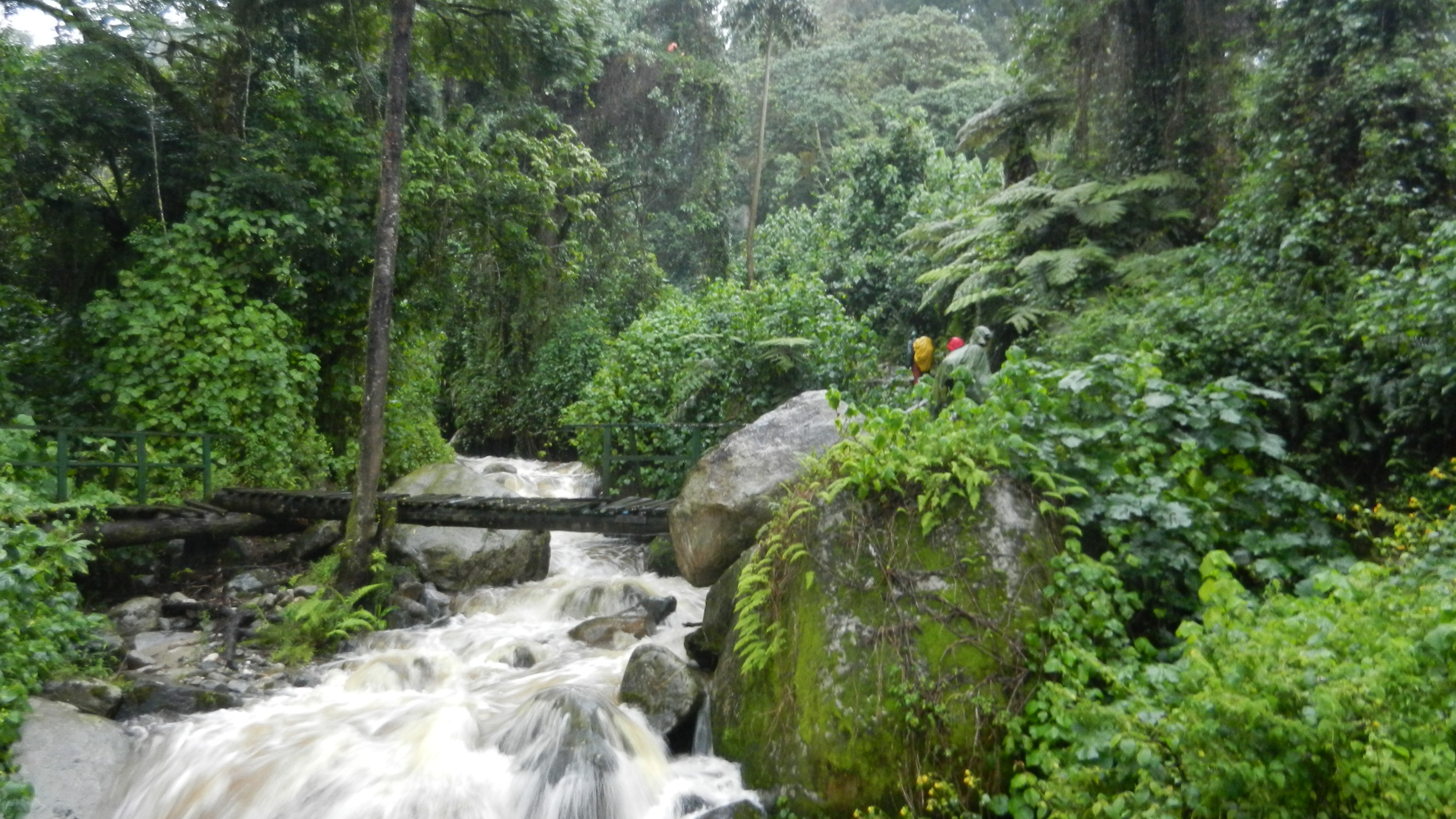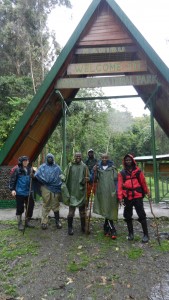Challenge is the core of all human activity. If there’s an ocean we cross it. If there’s a record we break it. If there’s a disease we cure it. If there’s a wrong we right it. If there’s a mountain we climb it. – James Ramsey Ullman
I have my suspicions. I think the mountain has a mind of it’s own. And a personality to go along with it; a vicious and vengeful one at that, if you asked me. until this moment, Rwenzori must have taken us for daytime court-jesters. How clear blue skies could, without as much as warning erupt into a thundering rainstorm was hard to comprehend, let alone accept. On the street pavement, you stop for the rain. On the mountain, you look up, look down, shake some and carry on. On this terrain, you blend. That, as we were now painfully finding out, is the unwritten rule of engagement. We even stopped to take pictures in the rain. No, there was nothing romantic about it. This was the new life we were embracing, the road less travelled and we were not coming this way again.
This marked the start of our grand foray into the future we had always talked about. Our ship was finally sailing, albeit under stormy weather.
Lesson # 1 came rolling in fast at this very early stage: Never, ever go to the mountain during the rain season. Never. Unless of course you are made of stainless steel.
The word “Brutal” is an euphemism that only starts to describe what we were going to encounter in the next 5 hours; this rite of passage had a hefty price tag to it. The smiles on our faces quickly turned into grimaces as we started up the slopes to gain 4000ft (1200m) of elevation. But for the swishing sound of the rain and rubber boots and the wildlife around us, all was quiet. Not a word spoken. Much like that first night of boarding school, reality was starting to sink in. Our trail followed the Mubuku River crossing through lowland equatorial rain forest and involved scrambling up slippery rock surfaces before reaching River Mahoma where the vegetation noticeably starts thinning out, giving way to more “leg room.” That effectively took us half the distance covered for the day. For safety, and because of the narrowness of the trail, we moved in single file formation throughout the climb.
Once we crossed the bridge over River Mahoma, the climb got really steep, so steep that the gaps between the men became wider and wider with every heavy step. I could not help but picture the mountain shrieking with laughter, mocking and daring us to go on. And Darwinism – the art of survival – was also now at play. Somewhere along this trail, I found myself alone. I got a glimpse of a couple of the men ahead of me but two of my traveling companions had fallen far behind. Reasoning they must be around the bend, I paused, resting my weight on my nkoni (walking stick) and waited. 5, 10, 20 minutes. Then along came one of the men. He too was surprised that the other man was nowhere in sight but continued to trek on as I made to go back down. Just as I turned the corner I peered over my back and saw him following me. I was greatly encouraged. The brotherhood was still alive and well. We were not leaving a man on this mountain. A porter we met along the way confirmed he had left the man we were looking for prostrate on the ground not too far from where we were. We did find him – stretched out on the ground, his hands propping up his upper body. By his own admission, he had not respected the mountain. We laughed about it, shared an energy bar and walked a little together. Not wanting to be pressured to move at our pace, he urged us on. We did. As soon as we caught up with the rest of the team, we compelled the guide to trace his way back to him.
On arrival at Nyabitaba (the first camp in the national park), all dirty and dripping, we gathered around the smoking fire. The look on our faces betrayed what our proud selves could not admit. “What did we get ourselves into?” was the rhetorical question written all over the men’s furrowed foreheads. The rain that was still falling had dampened not only our gear but also our spirits. And it had shredded to smithereens two rain ponchos. In a fit of rage, we contemplated shipping all the little pieces of those two offending items to the manufacturers in South Africa – with a protest note. The other affected man, who lives in South Africa, went ahead to lump the pieces together and vowed to do just that. When he picked me up three weeks later at the airport in Johannesburg, that obviously was the last thing on his mind. No, it was not even on his mind. To this day there has been no mention of the ponchos.
Now, if I thought I could not take in any more after this day, I had something else coming. In near sub-zero temperatures, my blood ran cold as I unpacked. In my haste to catch my flight to Entebbe a few days earlier, I had inadvertently picked up my daughter’s comfort-zone grade sleeping bag; the one she uses when we go camping and for school sleep-overs. I was in for a long night. Sleep deprivation is nothing new to me but I needed my sleep tonight.
A warm shower and several layers of my already damp thermal wear and all the warm clothing I could add did very little to help; I was freezing. And this was going to be the last night I would have any semblance of sleep; beyond this camp, the air is thin and sleep a luxury. On and off, I managed two hours of shut eye. Sometime in the night it also dawned on me that this was just the beginning. And that, until the fat lady sings, the opera was still on.


July 19, 2018 at 6:00 pm
I will start by calling on my sister Sanyu Suraiya Tushabe….
The brother’s keeper actually happened. The other side of the story. I knew it would come…
July 19, 2018 at 6:01 pm
Reading two stories of the same event is not only fascinating but at some point it gets me confused while clarifying lots of other details. I find myself having to concentrate deeply to get it all together.
Despite knowing that you came back safely I still cringe and hang on the edge. Now how does an adult manage with a small gal’s sleeping bag in icecold weather….man or man?!!! Speechless
July 19, 2018 at 6:01 pm
This is an incredible read. Your prose is so powerful. I am so proud of you. You are made of steel. I want to hear the rest of the story. You are a rare Ugandan. Are you planning on a book?
July 19, 2018 at 6:02 pm
Michelle Barlow, Sanyu Penelope, Twonjex Mugarura, Bernard Tabaire, Karamagi Andrew Julie Nabwire
July 19, 2018 at 6:02 pm
Kyekyo Ssebbo !
July 19, 2018 at 6:03 pm
Stephen Ochola
July 19, 2018 at 6:04 pm
Jacob Zikusooka, you are a story teller!
July 19, 2018 at 6:04 pm
Starting the morning with 2 accounts of climbing the Rwenzori and your here to tell the story reminds to hang in there on any current bu hardships as they last for just a while. Thanks bros…
July 19, 2018 at 6:05 pm
Uganda missed Colonels in you- just imagining if that crew attacked Al-shabab !
July 19, 2018 at 6:06 pm
Jacob Zikusooka, i also want to be like you when i grow up
July 19, 2018 at 6:08 pm
Wow, what a smooth story teller you are, making those hardships of cold sound palatable for all. Jacob Zikusooka you can even sell a refrigerator to the eskimos at this rate, thank you sir for a very well written memoir.
July 19, 2018 at 6:08 pm
Hmmm just sitting down to read the ‘thriller’ (will tell you about that when we meet). Don’t you know to tag significant others?
July 19, 2018 at 6:13 pm
Ha my sister Ary, you have me in a corner. I stand rebuked! PS. Am not waiting for when we meet, if history is anything to go by:))
July 19, 2018 at 6:13 pm
Betty, it won’t be long:))
July 19, 2018 at 6:14 pm
Baj, Peter, Leonard, you guys are encouragers. Thank you! PS. Leonard, the day you venture into publishing, I’ll be at your door with my manuscript:))
July 19, 2018 at 6:14 pm
Mwanyinazze Mirembe, there are reserves in all of us that only mountains bring out. The sleeping bag (or rather lack of it) was just the beginning. Even me I cringe:))
July 19, 2018 at 6:14 pm
Emma Mugisha, thank you. That was my greatest lesson coming off that mountain. My perspective on many things has been significantly altered!
July 19, 2018 at 6:15 pm
This is a captivating story. Looking forward to more….
July 19, 2018 at 6:15 pm
All I can say is WOW! I think mountains are their own creatures! I am in awe. Mountain climbing is not to be taken or undertaken lightly, wantonly, or without much thought!
July 19, 2018 at 6:16 pm
Thank you Rita. Jackie, wantonly indeed – I suppose that’s why they are called mountains!
July 19, 2018 at 6:17 pm
Eh Jacob Zikusooka I don’t know what’s more captivating; the story or the storytelling – personally am tempted to vote for the story telling. No disrespect for the great mountain!
July 19, 2018 at 6:18 pm
Jacob, give me a background of this story. I need to publish it as a travel piece. Great reading. By the way I spent part of my tea age in Musk at the slopes of the great mountain. Question, did I attempt to climb it?
July 19, 2018 at 6:20 pm
Speak to the mountain, Zero babel, be thou moved
July 19, 2018 at 6:20 pm
Ha ha ha Arthur, I vote with you. Am enjoying writing the story more than I did living it out:))
July 19, 2018 at 6:21 pm
Yeah Godfrey, I lived by the Museum but did I ever venture into it?! That’s the story of our lives. PS. Before this, I wrote two pieces, the earlier being the background. Take a peak on my timeline..
July 19, 2018 at 6:21 pm
Yes, I will speak. What are you, mighty mountain? Before Zerubbabel you will become level ground!
July 19, 2018 at 6:22 pm
So captivating! If facebook had real pages, this would he a page-turner!
July 19, 2018 at 6:23 pm
You redeemed yourself/yourselves. You were your brother’s keeper.
So that is the other side of that story.
Encouraging to know that men also have hearts of flesh.
July 19, 2018 at 6:24 pm
Eeeh but Suraiya, men have always had hearts of flesh:))
July 19, 2018 at 6:24 pm
Munnange, I thought you had forgotten your brother in pursuit of Margherita.
I was beginning to think it was all about competition.
July 19, 2018 at 6:25 pm
Ha ha ha, the brothers need to hear this! Am going to color them really bad in the episodes ahead:)
July 19, 2018 at 6:26 pm
Grace M Mugabi
Charles Odaga
July 19, 2018 at 6:26 pm
Brandon Ssemanda